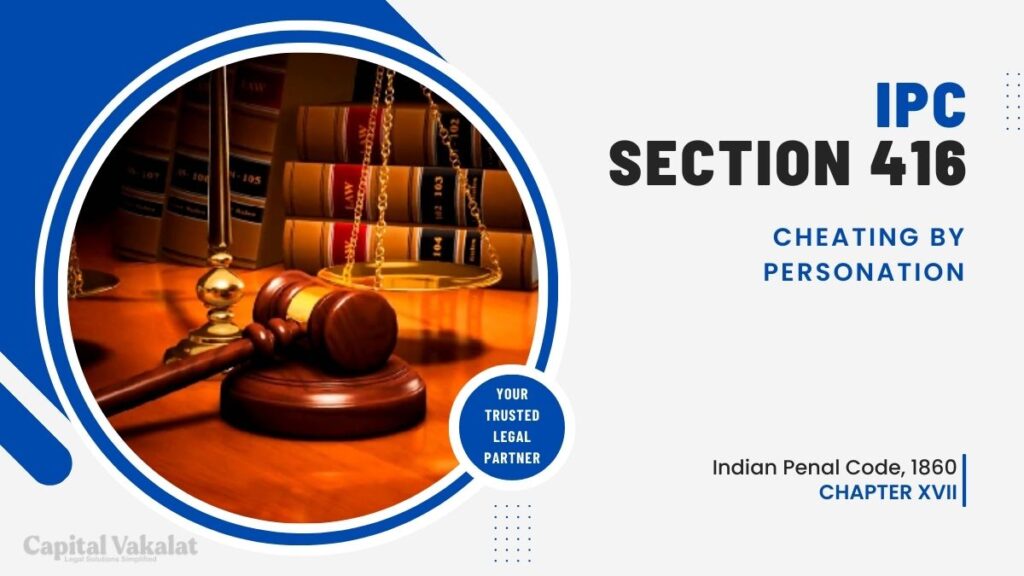Cheating by personation is a grave offense that has legal implications under Section 416 of the Indian Penal Code (IPC). This provision addresses cases where an individual dishonestly or fraudulently impersonates another person, leading to various forms of deception.

In this article, we will delve into the intricacies of Section 416 IPC, exploring its elements, legal consequences, real-world cases, and the significance of combating personation in the modern era.
Introduction to Section 416 IPC
Section 416 of the IPC is designed to tackle instances of cheating through personation. Personation involves assuming the identity of another person with the intent to deceive, leading to wrongful gain or causing a loss to someone else. This legal provision plays a crucial role in maintaining the integrity of transactions and relationships in society.
Understanding Cheating by Personation
Cheating by personation is a multifaceted concept that involves intentional deception for personal gain. It can manifest in various situations, from impersonating someone in academic examinations to assuming another person’s identity for financial fraud. The underlying thread in all cases is the fraudulent act of pretending to be someone else with the aim of achieving an unfair advantage.
Elements of Section 416 IPC
Impersonation Defined
The crux of Section 416 lies in the act of impersonation. The law defines impersonation as assuming the identity of another person, whether living or dead. This includes mimicking physical attributes, using identification documents, or adopting online personas with the intent to deceive.
Intent to Deceive
To constitute an offense under Section 416, there must be a clear intent to deceive. Mere impersonation without fraudulent intent may not fall under the purview of this section. Establishing the accused’s deceptive motives is crucial in legal proceedings.
Fraudulent or Dishonest Act
The impersonation must be accompanied by a fraudulent or dishonest act. This could range from attempting to secure a job by posing as someone else to engaging in financial transactions with the intent to defraud.
Cases and Examples
Notable Legal Cases
Several legal cases have set precedents in interpreting and applying Section 416. One such case involves…
Real-world Scenarios
Instances of cheating by personation are not confined to the legal realm. Real-world scenarios include identity theft, academic fraud, and online impersonation, each presenting unique challenges for law enforcement.
Legal Consequences
Penalties and Punishments
A conviction under Section 416 IPC carries significant penalties, including imprisonment and fines. The severity of punishment depends on factors such as the extent of deception, the financial implications, and the accused’s criminal history.
Judicial Precedents
Examining judicial precedents provides insights into how courts have interpreted and applied Section 416 in different circumstances. Understanding these precedents is crucial for legal professionals and the public alike.
Prevention and Awareness
Safeguards Against Personation
Preventing cheating by personation requires a multifaceted approach. Educational institutions, employers, and individuals can implement safeguards such as biometric authentication, stringent identity verification processes, and awareness campaigns.
Educational Initiatives
Educational institutions play a pivotal role in preventing personation. By incorporating awareness programs into curricula and adopting modern technologies for secure examinations, institutions can contribute to curbing this offense.
Significance in Modern Society
Technology and Personation
Advancements in technology have both facilitated and complicated cases of cheating by personation. From deepfake technology to identity theft online, the digital age presents new challenges in combating fraudulent impersonation.
Cybercrime Implications
The intersection of personation and cybercrime is a growing concern. Hacking, phishing, and online scams often involve elements of impersonation, emphasizing the need for updated legal frameworks and cybersecurity measures.
Challenges in Prosecution
Gathering Evidence
Prosecuting cases under Section 416 can be challenging, especially in the absence of concrete evidence. Overcoming these challenges requires effective collaboration between law enforcement agencies, technology experts, and legal professionals.
Identifying Impersonators
Unmasking impersonators is a complex task. The article explores the difficulties in identifying and apprehending individuals engaged in cheating by personation and proposes potential solutions.
Comparative Analysis with Other Sections
Contrasting Section 416 IPC
A comparative analysis of Section 416 with other relevant sections of the IPC sheds light on the distinct features and nuances of cheating by personation. Understanding these differences is crucial for legal practitioners and policymakers.
Overlapping Offenses
Exploring the overlap between Section 416 and related offenses provides a comprehensive view of the legal landscape surrounding personation. This section delves into instances where multiple offenses may be applicable.
Conclusion
In conclusion, Section 416 IPC serves as a vital tool in combating cheating by personation, a pervasive issue with implications across various domains. As technology advances, the legal framework must evolve to address new challenges. It is imperative for society, legal professionals, and policymakers to work collaboratively to prevent, prosecute, and deter instances of cheating by personation.
Frequently Asked Questions
How can educational institutions prevent cheating by personation?
Educational institutions can implement biometric authentication, secure examination processes, and awareness programs to prevent personation.
Are there specific challenges in prosecuting cases under Section 416 IPC?
Yes, challenges include gathering evidence and identifying impersonators, requiring collaboration between law enforcement and technology experts.
What role does technology play in cases of cheating by personation?
Technology both facilitates and complicates personation cases, with advancements like deepfake technology and online identity theft posing new challenges.
Is cheating by personation limited to academic fraud, or does it extend to other areas?
Personation extends beyond academia to various domains, including identity theft, financial fraud, and online impersonation.